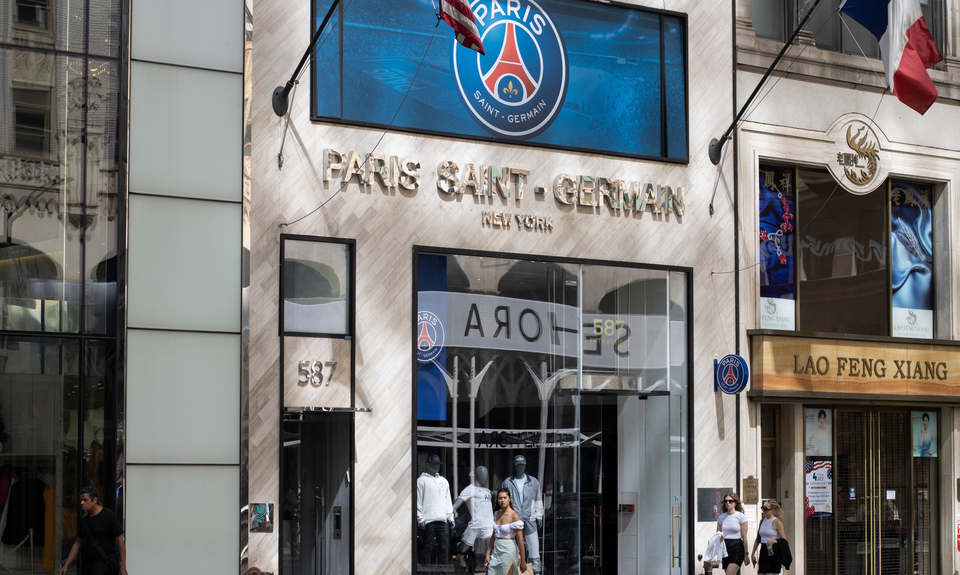Is PSG still a football club? For Simon Chadwick, Professor of Sport and Geopolitical Economy and Researcher at Skema Business School, it is first and foremost a fashion brand. That’s how Qatar hopes to make a return on its investment. To the despair of its oldest supporters, but to the delight of New York’s singing stars.
You said in a recent interview PSG was never intended to be a football club for its Qatari’s owners: what is supposed to be PSG for them?
Simon Chadwick: Investing in an elite professional football nowadays is never going to be a case of philanthropic endeavour or altruism. The likes of QSI (Qatar Sports Investments) invest in clubs such as PSG to achieve a financial return on investment. Put in simple terms, you spend a million to make two million back, otherwise what’s the point?
The challenge then becomes how to do this, which can be addressed in various ways. It is very clear that football alone is insufficient as a driver of revenues, hence its convergence with digital technologies, entertainment, and fashion and lifestyle are becoming important drivers of clubs’ commercial activities. One need only look at how streaming is helping to transform Ryan Reynolds-owned Wrexham or how important Venezia’s fashionable range of Kappa team shirts have become. It is within such parameters that PSG is now being run, though the club has an asset at its disposal that others don’t – Paris itself.
As a global style capital, potently symbolised by the Eiffel Tower, PSG and its badge represent something identifiable and saleable. Indeed, if one thinks of the iconic New York Yankees baseball cap – which people buy even if they are not baseball fans – this provides an indication of what PSG is trying to achieve. The club is a lifestyle brand, not simply a football club, which evokes all manner of positive associations in the minds of consumers (not just fans) around the world.
Many French fans of PSG are frustrated every year with the new home jersey of their club, which is supposed to be the classic Hechter model. And indeed, PSG is perhaps the only big European club which never has the same one every year. Yet it’s a jersey designed by a great couturier! Is it linked with the Qatari project for the club?
It has become an inconvenient truth for football fans around the world that a range of new team shirts will inevitably be produced each year. These items are characterised by inelastic demand, which means that people buy them no matter what – because it’s important in terms of their fandom and self-identity. On this basis, revenues from shirt sales have become an important part of clubs’ annual revenues, which puts an onus upon them to create new designs each year that are sufficiently different to the previous year’s designs. In this regard, there’s nothing unique, special, or different about what PSG is doing.
It is worthwhile keeping in mind that constantly design change and innovation is also a way of addressing the challenges posed by counterfeiters, who routinely undermine clubs’ revenue streams. But there is also something important about how PSG sees itself; this is not just a football club selling shirts to ardent fans, it is a lifestyle and fashion brand that seeks to target market segments other than those who like to watch games. Through its various fashion collaborations and retail activities, the organisation seeks to cultivate a stylish, fashionable image that extends way beyond football. The club’s officials have sought to cultivate a brand that is aspirational and stylish in a way that positions it alongside, for instance, Balenciaga and makes it hugely desirable. Indeed, one need only pick-up a copy of a fashion magazine like Hypebeast to understand that PSG is about something much, much more than football.
What are the main values/symbols of the PSG as a streetwear fashion brand?
Because of what has happened over the last twelve years, the letters ‘PSG’ carry some kudos and meaning now – there are values, successes, and celebrities associated with the brand. In addition, the Eiffel Tower is shorthand that helps audiences around the world that the club is synonymous with fashion, style, cutting edge design. All of this is perpetuated by the likes of Jay-Z being seen at the Parc des Princes wearing his PSG bomber, and by rappers such as Niska and Dave showcasing the club in their videos.
Among some consumer groups, ‘PSG’ is about as 21st century as it comes – it’s not just about money and success, it’s about looking good and wearing cutting edge clothing that is very different to standard football merchandise, especially in terms of its designs and where it is sold. PSG is about the Champs-Élysées, New York’s Fifth Avenue, and London’s Oxford Street, on all of which the club has retail outlets. The branding is deliberately intended to communicate difference, status, and prestige to target audiences that are often outside France.
Is Qatar planning forever for PSG? Can we imagine that Qatar relocates PSG in its own championship to compete with Arabia’s one or does this contradict the PSG as a fashion brand?
A more apt question would seem to be ‘is Qatar planning forever Paris?’. The power of Paris is currently being used to drive QSI’s investment in the club, and it is hard to see how the ‘power of Doha’ or the ‘power of Al-Wakra’ is likely to transcend this any time soon. There is eternal value in Brand Paris which, through ownership of PSG, the Qatari owners are capitalising on. Qatar’s also small, no more than three hundred thousand Qataris in total, the country doesn’t provide either market volume or the evocative branding opportunities that Paris, France, and their connections to both the Arab world and the world in general do. It is not impossible that we might see a PSG franchise network being established in the future, but as a brand there’s too much equity in Paris for another place to quickly transcend what the city offers in marketing terms. Perhaps we might see an LA offshoot, or a Tokyo franchise, but Paris will remain the star of the show.
Who could buy the brand PSG in the future? Another state? Another fashion brand? Nike?
Currently, there is nothing to suggest that PSG’s current owners are about to dispose of their asset. Instead, we are likely to see the owners sweating their asset, making it work harder to generate the sustained revenue flows it aspires to. The brand will be developed and extended, which will be an interesting challenge for club officials – maintaining credibility and prestige whilst at the same time building ubiquity and omnipotence. There is a possibility that we may see minority stakes in the club being sold – perhaps to a close existing partner such as Nike or maybe to a media corporation such as Disney – but one doesn’t envisage the entire disposal of the asset.






